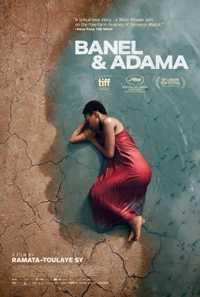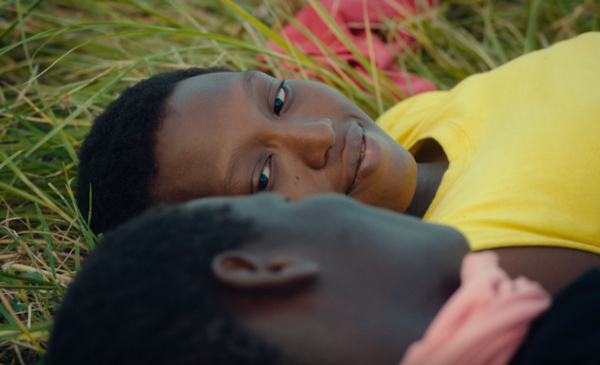A Place in the Sun: Sy’s Fascinating Debut on Ruinous Social Obligations
 It takes a village…to put you in your place, or so it would seem in French-Senegalese director Ramata-Toulaye Sy’s commanding debut, Banel & Adama. A striking tale on the burden of lineage as a suffocating albatross, Sy conjures a wickedly enticing lead performance from newcomer Khady Mane as a woman who refuses to adhere to the expectations transposed upon her. An ethereal tone sets the stage for an increasingly desperate fable on dreams distilled and the eroding friction of resistance. There’s a timeless quality to its minimalist nature, but Sy’s film feels anything but spare.
It takes a village…to put you in your place, or so it would seem in French-Senegalese director Ramata-Toulaye Sy’s commanding debut, Banel & Adama. A striking tale on the burden of lineage as a suffocating albatross, Sy conjures a wickedly enticing lead performance from newcomer Khady Mane as a woman who refuses to adhere to the expectations transposed upon her. An ethereal tone sets the stage for an increasingly desperate fable on dreams distilled and the eroding friction of resistance. There’s a timeless quality to its minimalist nature, but Sy’s film feels anything but spare.
Banel (Mane) is clearly a force to be reckoned with in her northern Senegalese village, eschewing the attention of all others, including her own mother, to bask in the glow of her love for Adama (Mamadou Diallo). She angrily fusses about her mother-in-law’s request that she work in the fields so the necessary crops are planted for the coming rain rather than herd the cattle with her husband. Initially, her attitude seems like a temper tantrum, until it’s revealed her marriage to Adama was made possible only through significant conniving and tragedy. Banel was previously the second wife of Adama’s older brother, Yero, who died mysteriously. Based on village tradition, she was allowed to wed Adama, her childhood sweetheart. But now, with Adama’s older brother and father gone, the village elders expect Adama to assume the role as their Chief, which Adama rejects outright. The lovebirds’ plan is to move to the outskirts of the village in a pair of abandoned houses which have long been covered by a pit of sand. Adama’s twin brother advises her against this, stating he was gifted with reason while his sister is led by her heart, leading to her uncontrollable urges. Initially, it appears the village accepts Adama’s wishes, much to his mother’s chagrin, the responsibility tentatively navigating to his cousin, Djibril, who is hungry for the title.
But when the rain doesn’t come and the excruciating heat decimates their livestock, it’s interpreted as a curse on the village due to Adama’s rejection of his lineage. As their dream house finally juts out from the sand, ready for their inhabitation, Adama caves to the village’s wishes and accepts his fate. For while Banel may be all ‘heart,’ she’s also a destructive one. A crackerjack with a slingshot, she is a destroyer, while Adama is the empathetic nurturer. Her unyielding insistence on rejecting the villagers and their needs proves to be fatal.

Banel is a fascinating figure, roaming the village as a haughty, friendless member of the community whose experiences have led her to resent their traditions. It appears Banel had her sights set on Adama since they were children, and she repeats their name as a constant refrain, a mantra to solidify their union in the heavens. We receive fleeting hints about Yero’s potentially mysterious death, having drowned in an unsecured well, and Banel anguishes about what she had to do to receive the marriage she desired. It smacks of the love-fool murders of Theodore Dreiser’s An American Tragedy, famously adapted by George Stevens’ A Place in the Sun (1951), where a young man drowns the pregnant girlfriend society expects him to marry to pursue the beautiful heiress who responds to his advances.
As Banel’s mother-in-law warns her, Adama will need to produce a male heir, and her refusal to have children will require him to eventually take a second wife. Paired with this ominous future is Malik, a mysterious young boy who is defined as an ‘angel scribe,’ recording everyone’s good and bad deeds. His inquisitive stares at Banel unnerve her, for she’s done some pretty bad things.
Sy evokes a sense of magical realism, with Banel depicted as grabbing the wind and ingesting it. And as we know, those who inherit the wind have made trouble in their house. Banel and Adama’s desired abode feels like the inverse of Hiroshi Teshigahara’s classic Woman in the Dunes (1964), where a sexually neglected woman is trapped in a constantly collapsing house of sand, the villagers throwing men into her spidery trap as appeasement. Amine Berrada (who also lensed Hounds at 2023 Cannes Film Festival) conveys this mysteriousness with some beautiful shot compositions, which allows Banel & Adama a haunting quality in this effective, impressive feature debut.
Reviewed on May 20th at the 2023 Cannes Film Festival – Competition. 87 Min.
★★★½/☆☆☆☆☆


